
It is interesting that the term “change” carries the burden of fear and anxiety. In reality, stagnation may do more harm. So when you contemplate a change in your life, either personally or professionally, think of it as a pivotal moment where you are positioned at a central point in time and turning toward something better. This compendium of life hacks offers ideas to get to that better place.
When it is time to change your life, following are common personal and career life hacks to pack for your self help journey.
Adjust Your Mindset
From the time you were old enough to be verbal, adults have posed the question, “What do you want to be when you grow up?” So it makes sense that you would grow up with the mindset that you need to make a decision and stick with it. This thinking sets the stage for resistance to change.
Many of us work hard to maintain stability when our efforts would be put to better use by learning to adapt and even embrace change since that is the true constant in life. Build a tool kit of self help techniques to improve your readiness to pivot when you need to.

Get Things Done
Whether the change in your life takes the form of switching careers, writing a novel, or managing a home or office renovation, efficiency life hacks enable you to focus on what is imminent. As suggested by David Allen in his self help book, “Getting Things Done,” establish a “Tickler” system. This is an organizational tool utilizing a daily calendar, with files set up for each day of the week and organizing daily tasks to manage your workflow. There are several ways to accomplish this, so find a method that works for you. One approach is to set aside time every evening to make a list of everything you need to accomplish the next day. Break down daunting tasks to smaller ones. Filter and prioritize each task, taking into account the estimated time of completion.
Allen’s book was published in 2001, and his original framework involved paper and physical folders. Leverage today’s technology to utilize a system-based repository, such as an Outlook to-do list or calendar. This avoids the need to remember details and due dates. When the system takes over for your memory, it frees your mind to focus on whatever you need to do right now. If you get nothing accomplished each day except your top one to three priorities, pat yourself on the back because you have succeeded in diverting away from lesser important activities.

Get Organized
For some people, pivoting is less about a career or relationship change and more about harnessing energy and feeling in control. Inbox zero is a self help life hack for establishing and maintaining a level of organization to mitigate the sense of feeling overwhelmed. This is where all messages have either been addressed and saved in a sub-folder, moved out as a follow-up task, deleted, or marked as spam never to darken your inbox again.
This approach reduces procrastination and provides peace of mind that important emails have not been missed and that no one is fuming because you haven’t responded to an urgent matter. As a word of caution, though, this practice can become addictive. Some people get so consumed by this exercise that they neglect doing their work in favor of organizing it.

Recognizing When it is Time to Pivot
Somehow, we instinctively know when it is time for a change. A beacon of light may shine through the darkness of a life-changing event. You may hear a quote that resonates with you or have an epiphany, evoked from the words of an influencer.
If your career progression has stymied, or you realize it has veered off track, this may be a signal to explore other opportunities. Any number of actions can prompt this realization.
If you are delegated responsibilities out of sync with your goals, sense that your skills are devalued in the company or marketplace, experience the telltale signs of burnout or simply feel bored, it may be time to pivot.

Listen to your body. If you are putting in too many hours or working normal hours with each hour feeling like a hundred, it could wreak havoc on your well-being. Discontent will often flow through to your personal relationships. Career and private matters may converge or overlap. When the homeostasis of your body becomes unstable, the human body has the miraculous capacity to raise red flags. Respect these messages, examine your life, and recognize it is time for a change.
Whatever triggered your decision to pivot, take the time to think it through. To assure yourself it is not an impulsive move based on pure emotion, formulate a plan. Set goals, and reach out for support.
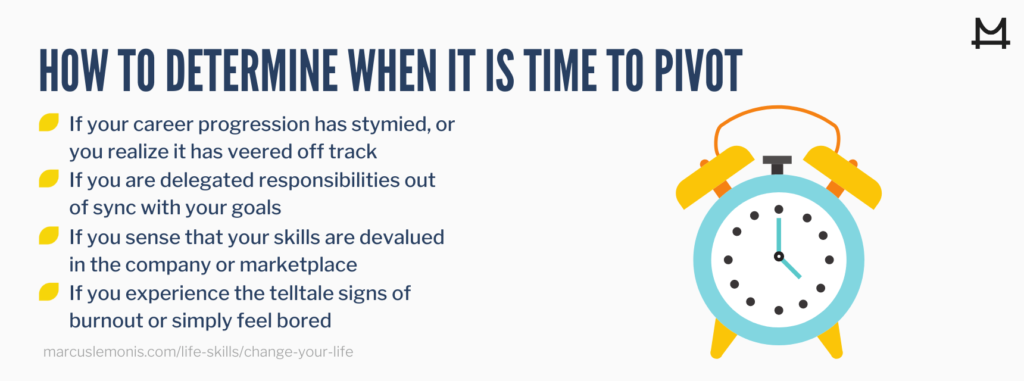
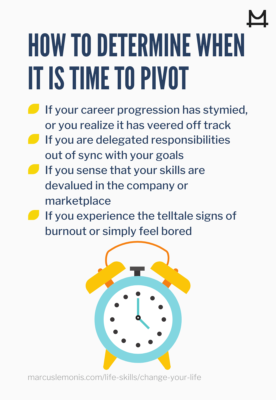
Life Hacks for Pivoting
1. Goal Setting
Goal # 1: Continuous Learning
Reassess your career objective, and check if you are on track. Do you have the attributes to move in a linear direction, cross over into another industry or migrate to a lateral position? If there are any gaps in your knowledge or skills, set a goal to identify and enroll in relevant classes. If your current or targeted role lends itself to a certification, do some research to learn how to become certified.

Goal # 2: Be Resumé-ready
Resumés continue to be the primary document in a job search for most industries. Even if you are not ready to enter the job market, set a goal to keep your resumé updated and ready to go. If you are pursuing an internal promotion, know that some companies ask their employees for this document as well. Creating a resumé is also an effective discipline for reviewing where you are in your career, how you have grown and your proficiency levels.
Goal # 3: Stay Informed of Job Requirements
Set a goal to keep abreast of technical, leadership and people skills in demand for your profession. Visit job boards to read job descriptions of the job to which you aspire, and see how your knowledge and skills lineup. If your company provides access to an internal job board, take a peek at that too. Review the requirements for new incumbents in your position to check if your company has expanded their criteria.
Goal # 4: Refresh Social Media
Keep your social media profiles current and consistent. If possible, arrange to have your photo taken professionally and saved in a digital format. Every time your resumé is updated, be sure your profiles on social media and industry-specific websites convey the same image and level of professionalism. If you are not already a member of a professional organization, research your industry for opportunities to join a group of peers.
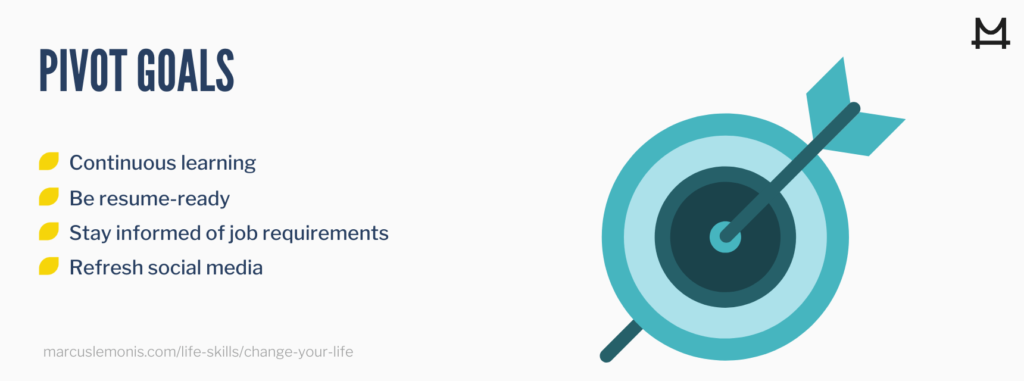
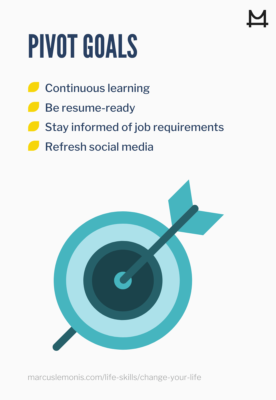
2. Leverage Your Network
Many people have credited their professional network for their success. Set a goal to build and nurture your network, not only to take your career to the next level but also to share your expertise and to be present in the groups you find relevant. This should not come across as self-serving. Participate in the groups you join, and make constructive comments on member posts.
3. Book Recommendation: “Give and Take,” by Adam Grant
Adam Grant is an organizational psychologist and business professor at Wharton School of the University of Pennsylvania. He is also the author of a book entitled, “Give and Take.” In his book, he establishes three categories of workers: takers, givers and matchers. Takers are interested in what you can do for them. Givers want to know what they can do for you. Matchers are more interested in quid pro quo, meaning they will do something for you if you return the favor. Grant spearheaded a study that concluded most people are matchers, but givers are the key contributors to the organization.
Givers can pivot a team in a positive direction, and Grant proposes how to facilitate this. “If we can weed takers out of organizations, if we can make it safe to ask for help, if we can protect givers from burnout and make it OK for them to be ambitious in pursuing their own goals as well as trying to help other people, we can actually change the way people define success. Instead of saying it’s all about winning a competition, people will realize success is really more about contribution.” Grant believes that the most meaningful way to succeed is to help others succeed.

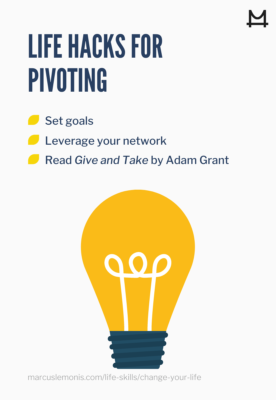
What a Successful Pivot Looks Like
1. Growth
Defining growth is personal. A pivot can lead to great career growth. Other times, it can simply bring you to a better place in your life. In an article about Jenny Blake’s book, “Pivot: The Only Move That Matters Is Your Next One,” one of the tenets stated is that “changes are usually for the best.” When Blake conducted interviews for her book, she did not encounter one person who said the pivot resulted in making their life worse. Some people were more positive, saying that those changes were for the best and worked out eventually. For some people, that is growth.
2. After Your Goals are Met
Once you have met your goals, consider joining a mentoring program. Research high schools and colleges that offer mentoring opportunities. Many of these institutions greatly appreciate partnering with the professional community to provide students with guidance on corporate life and other employment scenarios. Volunteering as a mentor allows those entering the workforce to benefit from your learnings.
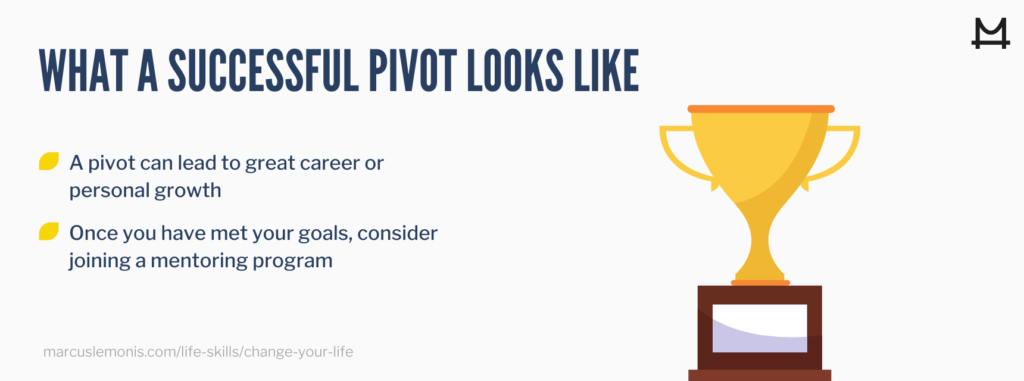
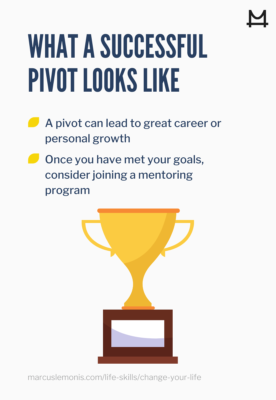
Be Ready For A Pivot
Through the many tragedies brought on by the global pandemic, maybe we can find a teachable moment, which is to always be ready to pivot in response to events that manifest in unimaginable ways. With the power of creativity, innovation, resilience and tenacity, human beings continue to reinvent themselves and guide others toward solutions, helping people help themselves.
- Have you had to pivot your life?
- How can you successfully pivot your life to achieve your goals?





